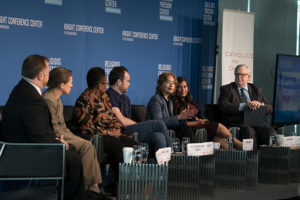Religious Freedom and the “Jurisprudence of the Absurd”
 Photo by Malek Naz Freidouni
Photo by Malek Naz Freidouni As a presidential candidate, Donald Trump got a lot of traction with his promise to build a “big, beautiful” wall along the US-Mexico border (and never forget he promised time and again that he’d make Mexico pay for it). For secular Americans, the greater, more beautiful wall has always been the one that separates church and state, a wall many conservative Christians would like to weaken to accommodate their ideological positions.
I attended a panel discussion at the Newseum’s Religious Freedom Center last week titled, “Church and State: How Separate Should They Be?” The event was sponsored by the British online magazine Spiked and Catholics for Choice. Spiked Editor Brendan O’Neill and CFC’s Director of Communications, Cynthia Romero, were joined by Wendy Kaminer (author, lawyer, and civil libertarian); Rev. Rosemary Bray McNatt (president of Starr King School for the Ministry, a UU seminary in Berkeley, California); Julianna S. Gonen (policy director at the National Center for Lesbian Rights); and Trevor Burrus (a research fellow at the Cato Institute’s Center for Constitutional Studies).
Moderator Gene Policinski of the Newseum Institute opened the discussion with statistics that 60 percent of Americans believe the founders intended the United States to be a Christian nation and 55 percent believe the Constitution says so. From there the panel looked at a variety of religious freedom cases and unanimously agreed on the necessity for keeping church and state separate.
Kaminer (who opened her remarks stating she was a lot less concerned with what the founders wanted the country to be than with what we today want it to be) stressed the importance of looking at religious freedom claims on a case by case basis, bearing in mind that those deciding must make value judgments about whose rights are more at risk. The panel spent a good deal of time discussing the upcoming Supreme Court case involving a Colorado baker who refused to create a custom cake for a same-sex wedding on the basis of his religious beliefs (Masterpiece Cakeshop v. Colorado Civil Rights Commission). Is the speech of baker Jack Phillips, who considers himself a cake artist, being compelled in the presentation of a wedding cake? And is the right not to be compelled more valuable than the right to equality? Gonen, also a lawyer, stressed how problematic it is to entertain the idea that selling a product to someone is in some way an endorsement of a person or persons (here, a cake to a gay couple). Kaminer, noting that she’s argued both sides of the case, thinks the vote will come down to Justice Anthony M. Kennedy and hopes that if the court sides with the baker, they issue a very narrow ruling.
The panelists also discussed the distinction between religious rights and religious power. Kim Davis, the county clerk in Kentucky who refused to issue marriage licenses to same-sex couples after Obergefell v. Hodges legalized those unions, wasn’t exercising her right to religious freedom, for example. She was exercising her power and violating the terms of her employment. Unlike the Masterpiece Cakeshop situation, Davis’s was a clear-cut violation of duty despite her insisting on, as Kaminer put it, “a constitutional right to violate the Constitution; a jurisprudence of the absurd.” And yet, others pointed out, Davis was a cause célèbre during the 2016 campaign. The direction the Trump administration has taken, a full gallop down the road of exemptions from civil rights laws to accommodate conservative Christianity, necessitates vigilant monitoring of these cases.
O’Neill, who often writes and speaks in favor of unfettered free speech, got into some trouble on the topic of same-sex marriage when he held that people have a right to the opinion that marriage should be between a man and a woman. “Is that necessarily a bigoted position?” he asked. “Yes, it is,” said Reverend McNatt who was seated right next to him. She recalled that when Kim Davis was refusing marriage licenses to gay couples, she was instantly brought back to a time when black Americans were denied equal rights.
Missing from the panel was anyone speaking for the religious right or otherwise defending religious bigotry. Burrus, who identified himself as an atheist, did comment that religion is one way for us to understand each other better, which drew head shaking from one or two panelists. Kaminer cautioned that in discussing religious liberty it was important, paraphrasing John Dewey, to think only of religions in the plural. (“There is no such thing as religion in the singular,” Dewey said. “There is only a multitude of religions.”) This is the key to pushing back on the narrow view of religion being forced upon us and that chips away at the rights of all who don’t adhere to it.
